简短的ted演讲稿.doc
ted演讲稿(精选13篇)
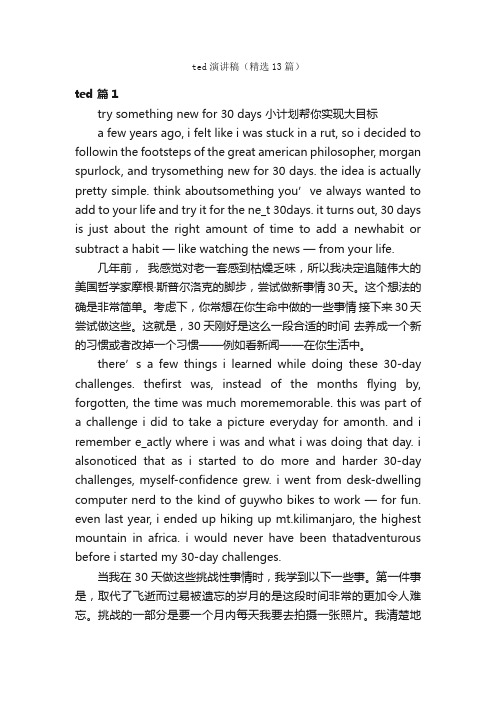
ted演讲稿(精选13篇)ted 篇1try something new for 30 days 小计划帮你实现大目标a few years ago, i felt like i was stuck in a rut, so i decided to followin the footsteps of the great american philosopher, morgan spurlock, and trysomething new for 30 days. the idea is actually pretty simple. think aboutsomething you’ve always wanted to add to your life and try it for the ne_t 30days. it turns out, 30 days is just about the right amount of time to add a newhabit or subtract a habit — like watching the news — from your life.几年前,我感觉对老一套感到枯燥乏味,所以我决定追随伟大的美国哲学家摩根·斯普尔洛克的脚步,尝试做新事情30天。
这个想法的确是非常简单。
考虑下,你常想在你生命中做的一些事情接下来30天尝试做这些。
这就是,30天刚好是这么一段合适的时间去养成一个新的习惯或者改掉一个习惯——例如看新闻——在你生活中。
there’s a few things i learned while doing these 30-day challenges. thefirst was, instead of the months flying by, forgotten, the time was much morememorable. this was part of a challenge i did to take a picture everyday for amonth. and i remember e_actly where i was and what i was doing that day. i alsonoticed that as i started to do more and harder 30-day challenges, myself-confidence grew. i went from desk-dwelling computer nerd to the kind of guywho bikes to work — for fun. even last year, i ended up hiking up mt.kilimanjaro, the highest mountain in africa. i would never have been thatadventurous before i started my 30-day challenges.当我在30天做这些挑战性事情时,我学到以下一些事。
TED演讲文稿大全.docx

ted 精彩演讲:坠机让我学到的三件事imagine a big explosion as you climb through 3,000 ft. imagine a plane full of smoke. imagine an engine going clack, clack, clack,clack, clack, clack, clack. it sounds scary.想像一个大爆炸,当你在三千多英尺的高空;想像机舱内布满黑烟,想像引擎发出喀啦、喀啦、喀啦、喀啦、喀啦的声响,听起来很可怕。
well i had a unique seat that day. i was sitting in 1d. i was the only one whocan talk to the flight attendants. so i looked at them right away, and they said,no problem. we probably hit some birds. the pilot had already turned the plane around, and we werent that far. you could see manhattan.那天我的位置很特別,我坐在 1d,我是唯一可以和空服员说话的人,于是我立刻看着他们,他们说,“没问题,我们可能撞上鸟了。
” 机长已经把机头转向,我们离目的地很近,已经可以看到曼哈顿了。
two minutes later, 3 things happened at the same time. the pilot lines up theplane with the hudson river. thats usually not the route. he turns off the engines.now imagine being in a plane with no sound. and then he says 3 words-the mostunemotional 3 words ive ever heard. he says, brace for impact.两分钟以后,三件事情同时发生:机长把飞机对齐哈德逊河,一般的航道可不是这样。
ted简短演讲稿中英对照
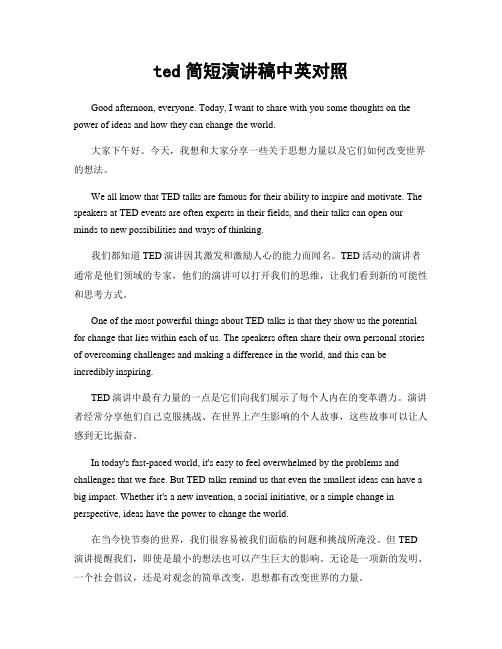
ted简短演讲稿中英对照Good afternoon, everyone. Today, I want to share with you some thoughts on the power of ideas and how they can change the world.大家下午好。
今天,我想和大家分享一些关于思想力量以及它们如何改变世界的想法。
We all know that TED talks are famous for their ability to inspire and motivate. The speakers at TED events are often experts in their fields, and their talks can open our minds to new possibilities and ways of thinking.我们都知道TED演讲因其激发和激励人心的能力而闻名。
TED活动的演讲者通常是他们领域的专家,他们的演讲可以打开我们的思维,让我们看到新的可能性和思考方式。
One of the most powerful things about TED talks is that they show us the potential for change that lies within each of us. The speakers often share their own personal stories of overcoming challenges and making a difference in the world, and this can be incredibly inspiring.TED演讲中最有力量的一点是它们向我们展示了每个人内在的变革潜力。
演讲者经常分享他们自己克服挑战、在世界上产生影响的个人故事,这些故事可以让人感到无比振奋。
ted演讲稿范文
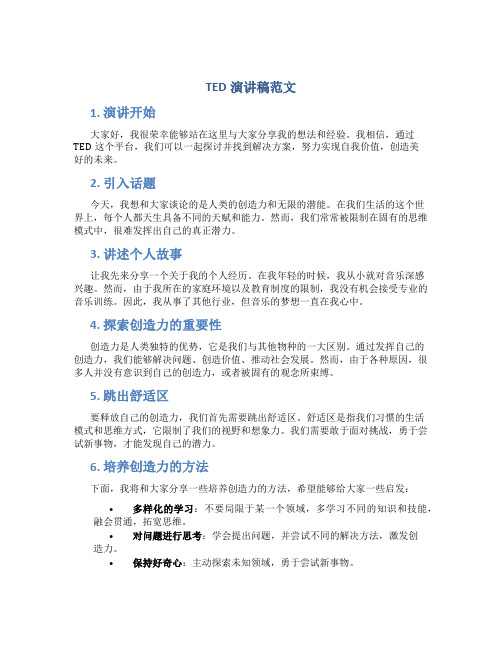
TED演讲稿范文1. 演讲开始大家好,我很荣幸能够站在这里与大家分享我的想法和经验。
我相信,通过TED这个平台,我们可以一起探讨并找到解决方案,努力实现自我价值,创造美好的未来。
2. 引入话题今天,我想和大家谈论的是人类的创造力和无限的潜能。
在我们生活的这个世界上,每个人都天生具备不同的天赋和能力。
然而,我们常常被限制在固有的思维模式中,很难发挥出自己的真正潜力。
3. 讲述个人故事让我先来分享一个关于我的个人经历。
在我年轻的时候,我从小就对音乐深感兴趣。
然而,由于我所在的家庭环境以及教育制度的限制,我没有机会接受专业的音乐训练。
因此,我从事了其他行业,但音乐的梦想一直在我心中。
4. 探索创造力的重要性创造力是人类独特的优势,它是我们与其他物种的一大区别。
通过发挥自己的创造力,我们能够解决问题、创造价值、推动社会发展。
然而,由于各种原因,很多人并没有意识到自己的创造力,或者被固有的观念所束缚。
5. 跳出舒适区要释放自己的创造力,我们首先需要跳出舒适区。
舒适区是指我们习惯的生活模式和思维方式,它限制了我们的视野和想象力。
我们需要敢于面对挑战,勇于尝试新事物,才能发现自己的潜力。
6. 培养创造力的方法下面,我将和大家分享一些培养创造力的方法,希望能够给大家一些启发:•多样化的学习:不要局限于某一个领域,多学习不同的知识和技能,融会贯通,拓宽思维。
•对问题进行思考:学会提出问题,并尝试不同的解决方法,激发创造力。
•保持好奇心:主动探索未知领域,勇于尝试新事物。
•与他人合作:与他人进行合作与交流,从他们的经验中学习,激发创新想法。
7. 激励他人释放潜力除了开发自己的创造力,我们还可以通过激励他人释放他们的潜力。
每个人都拥有独特的优点和能力,我们可以通过鼓励和支持,帮助他们发现自己的价值和潜力。
8. 结语在结束之前,我想再次强调创造力的重要性。
我们每个人都拥有无限的潜能,只有发挥自己的创造力,才能实现自我价值,为社会做出贡献。
ted演讲稿4篇_演讲稿
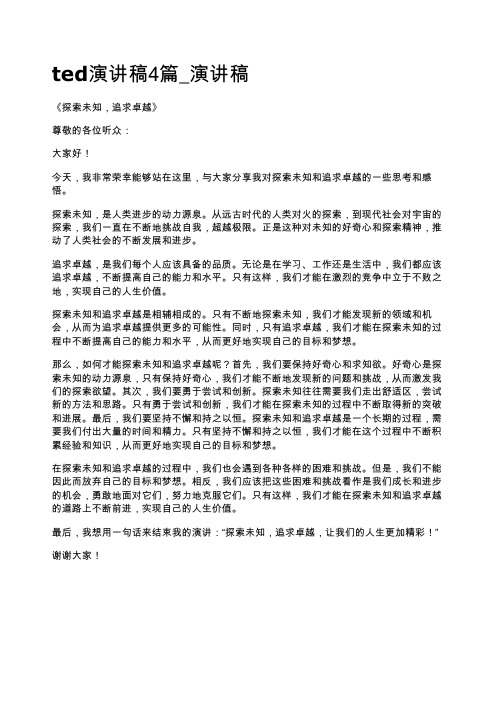
ted演讲稿4篇_演讲稿《探索未知,追求卓越》尊敬的各位听众:大家好!今天,我非常荣幸能够站在这里,与大家分享我对探索未知和追求卓越的一些思考和感悟。
探索未知,是人类进步的动力源泉。
从远古时代的人类对火的探索,到现代社会对宇宙的探索,我们一直在不断地挑战自我,超越极限。
正是这种对未知的好奇心和探索精神,推动了人类社会的不断发展和进步。
追求卓越,是我们每个人应该具备的品质。
无论是在学习、工作还是生活中,我们都应该追求卓越,不断提高自己的能力和水平。
只有这样,我们才能在激烈的竞争中立于不败之地,实现自己的人生价值。
探索未知和追求卓越是相辅相成的。
只有不断地探索未知,我们才能发现新的领域和机会,从而为追求卓越提供更多的可能性。
同时,只有追求卓越,我们才能在探索未知的过程中不断提高自己的能力和水平,从而更好地实现自己的目标和梦想。
那么,如何才能探索未知和追求卓越呢?首先,我们要保持好奇心和求知欲。
好奇心是探索未知的动力源泉,只有保持好奇心,我们才能不断地发现新的问题和挑战,从而激发我们的探索欲望。
其次,我们要勇于尝试和创新。
探索未知往往需要我们走出舒适区,尝试新的方法和思路。
只有勇于尝试和创新,我们才能在探索未知的过程中不断取得新的突破和进展。
最后,我们要坚持不懈和持之以恒。
探索未知和追求卓越是一个长期的过程,需要我们付出大量的时间和精力。
只有坚持不懈和持之以恒,我们才能在这个过程中不断积累经验和知识,从而更好地实现自己的目标和梦想。
在探索未知和追求卓越的过程中,我们也会遇到各种各样的困难和挑战。
但是,我们不能因此而放弃自己的目标和梦想。
相反,我们应该把这些困难和挑战看作是我们成长和进步的机会,勇敢地面对它们,努力地克服它们。
只有这样,我们才能在探索未知和追求卓越的道路上不断前进,实现自己的人生价值。
最后,我想用一句话来结束我的演讲:“探索未知,追求卓越,让我们的人生更加精彩!”谢谢大家!。
ted英文演讲稿(通用18篇)
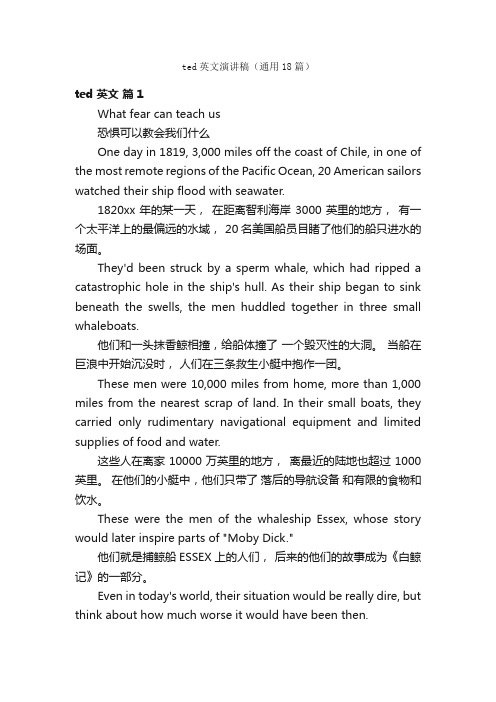
ted英文演讲稿(通用18篇)ted英文篇1What fear can teach us恐惧可以教会我们什么One day in 1819, 3,000 miles off the coast of Chile, in one of the most remote regions of the Pacific Ocean, 20 American sailors watched their ship flood with seawater.1820xx年的某一天,在距离智利海岸3000英里的地方,有一个太平洋上的最偏远的水域, 20名美国船员目睹了他们的船只进水的场面。
They'd been struck by a sperm whale, which had ripped a catastrophic hole in the ship's hull. As their ship began to sink beneath the swells, the men huddled together in three small whaleboats.他们和一头抹香鲸相撞,给船体撞了一个毁灭性的大洞。
当船在巨浪中开始沉没时,人们在三条救生小艇中抱作一团。
These men were 10,000 miles from home, more than 1,000 miles from the nearest scrap of land. In their small boats, they carried only rudimentary navigational equipment and limited supplies of food and water.这些人在离家10000万英里的地方,离最近的陆地也超过1000英里。
在他们的小艇中,他们只带了落后的导航设备和有限的食物和饮水。
TED演讲稿(含5篇)

TED演讲稿(含5篇)第一篇:TED演讲稿TED 演讲稿Good morning, everyone.My name is weitao, Before my speech, I want to share an experience at five years ago, At 2014.7.7 on the way to the work with my sister, I saw a bus for blood donation on the left, after I passed the bus, I realized that I had already 18 years old, and then, I ran home leaving my sister alone, about 10 minutes later, we began our first blood donation with our ID cards.In my heart I became a hero at the moment getting the Blood Donation Card.So today My topic is Donation blood.1998 is a special year for China's voluntary blood donation, this year, ‘Blood Donation Law’ took effect, it specifies that all the blood for clinical must come from Voluntary blood donation.During the 20 years, the number of voluntary blood donors nationwide rose from 328,000 in 1988 to 14.59 million in 2017, luckily, I am one of them.I believe there are many students had donated their blood.Now you can put your hands if you had donated blood or you want to donate your blood.Thanks for your love.I have a question, under what circumstances do we need blood transfusion?Traffic accident, leukemia, Parturient hemorrhage, surgery and so on.The patients need blood, and the blood must come from the healthy people.I can’t imagine that a mother suffering from Parturient Hemorrhage ,but there are not have the blood to save her life.And I also can’t imagine that a girl suffering from leukemia, when she gets the blood to save her life but unlucky affected by the AIDS in the blood.survival, death, and living death.And then I will talk a story about it.Are there anyclassmates from Henan? Do you know the wenlou village? Wenlou Village, located three kilometers from Shangcai County, Zhumadian City, Henan Province, used to be the main vegetable producing area in Shangcai County, however it is not famous for the vegetables but a nickname “AIDS village”.Before 1995, About 1310 peoples donated their blood, most villagers donate blood for money because of family poverty.Driven by economic interests, some blood products companies set up a single plasma collection site in Henan, illegally operating, collecting and purchasing raw material blood in large quantities, resulting in HIV spreads among the paid blood donors.According to the government reported, 43.48% paid blood donors infected with HIV before 1999.However, there are about 38 villages like Wenlou in Henan Province.This story was made into a movie which name is < Life Is A Miracle>, the main actors are Zhangziyi and Guofucheng.Someone says that it is difficult to live in china, yes, it is right, salted eggs with Sudan red, milk with melamine, seafood with formalin, blood with virus.However, the blood is different from others, because Artificial blood can't replace blood.Sometimes we must agree that some Chinese people are cute, they can always find the way to get money, blood, essentials of life, can also make money.The social give them a name “Blood head”.“No business, no harm.” In China, we must cut the link between the blood and money.So, in 1998, the law specifies the blood for clinical must come from the voluntary blood donation and the mutual blood donation was used to promote the voluntary blood donation.In 2018.3, the mutual blood was abandoned all over the China, which means that the blood would only come from the strangers’ love.This speech, just express my sincerely respect to the ”Blood Donation Law” and gratitude tothe blood donors.“Be there for someone else.Give blood, share life”.第二篇:TED演讲稿So I'm here to tell you that we have a problem with boys, and it's a serious problem with boys.Their culture isn't working in schools, and I'm going to share with you ways that we can think about overcoming that problem.First, I want to start by saying, this is a boy, and this is a girl, and this is probably stereotypically what you think of as a boy and a girl.If I essentialize gender for you today, then you can dismiss what I have to say.So I'm not going to do that.I'm not interested in doing that.This is a different kind of boy and a different kind of girl.So the point here is that not all boys exist within these rigid boundaries of what we think of as boys and girls, and not all girls exist within those rigid boundaries of what we think of as girls.But, in fact, most boys tend to be a certain way, and most girls tend to be a certain way.And the point is that, for boys, the way that they exist and the culture that they embrace isn't working well in schools now.1:08How do we know that? The Hundred Girls Project tells us some really nice statistics.For example, for every 100 girls that are suspended from school, there are 250 boys that are suspended from school.For every 100 girls who are expelled from school, there are 335 boys who are expelled from school.For every 100 girls in special education, there are 217 boys.For every 100 girls with a learning disability,there are 276 boys.For every 100 girls with an emotional disturbance diagnosed, we have 324 boys.And by the way, all of these numbers are significantly higher if you happen to be black, if you happen to be poor, if you happen to exist in an overcrowded school.And if you are a boy, you're four times as likely to be diagnosed with ADHD--AttentionDeficit Hyperactivity Disorder.2:02Now there is another side to this.And it is important that we recognize that women still need help in school, that salaries are still significantly lower, even when controlled for job types, and that girls have continued to struggle in math and science for years.That's all true.Nothing about that prevents us from paying attention to the literacy needs of our boys between ages three and 13.And so we should.In fact, what we ought to do is take a page from their playbook, because the initiatives and programs that have been set in place for women in science and engineering and mathematics are fantastic.They've done a lot of good for girls in these situations, and we ought to be thinking about how we can make that happen for boys too in their younger years.2:50Even in their older years, what we find is that there's still a problem.When we look at the universities,60 percent of baccalaureate degrees are going to women now, which isa significant shift.And in fact, university administrators are a little uncomfortable about the idea that we may be getting close to 70 percent female population in universities.This makes university administrators very nervous, because girls don't want to go to schools that don't have boys.And so we're starting to see the establishment of men centers and men studies to think about how do we engage men in their experiences in the university.If you talk to faculty, they may say, “Ugh.Yeah, well, they're playing video games, and they're gambling online all night long, and they're playing World of Warcraft, and that's affecting their academic achievement.” Guess what? Video games are not the cause.Video games are a symptom.They were turned off a long time before they got here.3:52So let's talk about why they got turned off when they were between the ages of three and13.There are three reasons that I believe that boys are out of sync with the culture of schools today.The first is zero tolerance.A kindergarten teacher I know, her son donated all of his toys to her, and when he did, she had to go through and pull out all the little plastic guns.You can't have plastic knives and swords and axes and all that kind of thing in a kindergarten classroom.What is it that we're afraid that this young man is going to do with this gun? I mean, really.But here he stands as testament to the fact that you can't roughhouse on the playground today.Now I'm not advocating for bullies.I'm not suggesting that we need to be allowing guns and knives into school.But when we say that an Eagle Scout in a high school classroom who has a locked parked car in the parking lot and a penknife in it has to be suspended from school, I think we may have gone a little too far with zero tolerance.4:55Another way that zero tolerance lives itself out is in the writing of boys.In a lot of classrooms todayyou're not allowed to write about anything that's violent.You're not allowed to write about anything that has to do with video games--these topics are banned.Boy comes home from school, and he says, “I hate writing.” “Why do you hate wri ting, son? What's wrong with writing?” “Now I have to write what she tells me to write.” “Okay, what is she telling you to write?” “Poems.I have to write poems.And little moments in my life.I don't want to write that stuff.” “All right.Well, what do you wa nt to write? What do you want to write about?” “I want to write about video games.I want to write about leveling-up.I want to write about this really interesting world.I want to write about a tornado that comes into our houseand blows all the windows out and ruins all the furniture and kills everybody.” “All right.Okay.” You tell a teacher that, and they'll ask you, in all seriousness, “Should wesend this child to the psychologist?”And the answer is no, he's just a boy.He's just a little boy.It's not okay to write these kinds of things in classrooms today.6:00So that's the first reason: zero tolerance policies and the way they're lived out.The next reason that boys' cultures are out of sync with school cultures: there are fewer male teachers.Anybody who's over 15 doesn't know what this means, because in the last 10 years, the number of elementary school classroom teachers has been cut in half.We went from 14 percent to seven percent.That means that 93 percent of the teachers that our young men get in elementary classrooms are women.Now what's the problem with this? Women are great.Yep, absolutely.But male role models for boys that say it's all right to be smart--they've got dads, they've got pastors, they've got Cub Scout leaders, but ultimately, six hours a day, five days a week they're spending in a classroom, and most of those classrooms are not places where men exist.And so they say, I guess this really isn't a place for boys.This is a place for girls.And I'm not very good at this, so I guess I'd better go play video games or get into sports, or something like that, because I obviously don't belong here.Men don't belong here, that's pretty obvious.7:06So that may be a very direct way that we see it happen.But less directly, the lack of male presence in the culture--you've got a teachers' lounge, and they're having a conversation about Joey and Johnny who beat each other up on the playground.“What are we going to do with these boys?” The answer to that question changes depending on who's sitting around that table.Are there men around that table?Are there moms who've raised boys around that table? You'll see, the conversation changes depending upon who's sitting around the table.7:36Third reason that boys are out of sync with schooltoday: kindergarten is the old second grade, folks.We have a serious compression of the curriculum happening out there.When you're three, you better be able to write your name legibly, or else we'll consider it a developmental delay.By the time you're in first grade, you should be able to read paragraphs of text with maybe a picture, maybe not, in a book of maybe 25 to 30 pages.If you don't, we're probably going to be putting you into a Title 1 special reading program.And if you ask Title 1 teachers, they'll tell you they've got about four or five boys for every girl that's in their program, in the elementary grades.8:11The reason that this is a problem is because the message that boys are getting is “you need to do what the teacher asks you to do all the time.” The teacher's salary de pends on “No Child Left Behind” and “Race to the Top” and accountability and testing and all of this.So she has to figure out a way to get all these boys through this curriculum--and girls.This compressed curriculum is bad for all active kids.And what happ ens is, she says, “Please, sit down, be quiet, do what you're told, follow the rules,manage your time, focus, be a girl.” That's what she tells them.Indirectly, that's what she tells them.And so this is a very serious problem.Where is it coming from? It's coming from us.(Laughter)We want our babies to read when they are six months old.Have you seen the ads? We want to live in Lake Wobegon where every child is above average, but what this does to our children is really not healthy.It's not developmentally appropriate, and it's particularly bad for boys.9:24So what do we do? We need to meet them where they are.We need to put ourselves into boy culture.We need to change the mindset of acceptance in boys in elementary schools.More specifically, we can do some very specific things.We can designbetter games.Most of the educational games that are out there today are really flashcards.They're glorified drill and practice.They don't have the depth, the rich narrative that really engaging video games have, that the boys are really interested in.So we need to design better games.We need to talk to teachers and parents and school board members and politicians.We need to make sure that people see that we need more men in the classroom.We need to look carefully at our zero tolerance policies.Do they make sense? We need to think about how to uncompress this curriculum if we can, trying to bring boys back into a space that is comfortable for them.All of those conversations need to be happening.10:20There are some great examples out there of schools--the New York Times just talked about a school recently.A game designer from the New School put together a wonderful video gaming school.But it only treats a few kids, and so this isn't very scalable.We have to change the culture and the feelingsthat politicians and school board members and parents have about the way we accept and what we accept in our schools today.We need to find more money for game design.Because good games, really good games, cost money, and World of Warcraft has quite a budget.Most of the educational games do not.Where we started: my colleagues--Mike Petner, Shawn Vashaw, myself--we started by trying to look at the teachers' attitudes and find out how do they really feel about gaming, what do they say about it.And we discovered that they talk about the kids in their school, who talk about gaming, in pretty demeaning ways.They say, “Oh, yeah.They're always talking about that stuff.They're talking about their little action figures and their little achievements or merit badges, or whatever it is that they get.And they're always talking about this stuff.” And they say thesethings as if it's okay.But if it were your culture, think of how that might feel.It's very uncomfortable to be on the receiving end of that kind of language.They're nervous about anything that has anything to do with violence because of the zero tolerance policies.They are sure that parents and administrators will never accept anything.11:45So we really need to think about looking at teacher attitudes and finding ways to change the attitudes so that teachers are much more open and accepting of boy cultures in their classrooms.Because, ultimately, if we don't, then we're going to have boys who leave elementary school saying, “Well I guess that was just a place for girls.It wasn't for me.So I've got to do gaming, or I've got to do sports.” If we change these things, if we pay attention to these things, and we re-engage boys in their learning, they will leave the elementary schools saying, “I'm smart.”第三篇:TED演讲稿TED精彩演讲:坠机让我学到的三件事Imagine a big explosion as you climb through 3,000 ft.Imagine a plane full of smoke.Imagine an engine going clack, clack, clack, clack, clack,clack, clack.It sounds scary.想像一个大爆炸,当你在三千多英尺的高空;想像机舱内布满黑烟,想像引擎发出喀啦、喀啦、喀啦、喀啦、喀啦的声响,听起来很可怕。
TED演讲稿(5篇范文)
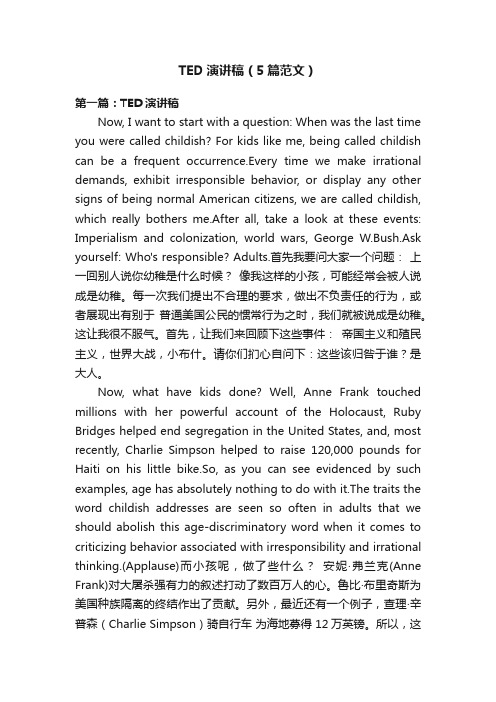
TED演讲稿(5篇范文)第一篇:TED演讲稿Now, I want to start with a question: When was the last time you were called childish? For kids like me, being called childish can be a frequent occurrence.Every time we make irrational demands, exhibit irresponsible behavior, or display any other signs of being normal American citizens, we are called childish, which really bothers me.After all, take a look at these events: Imperialism and colonization, world wars, George W.Bush.Ask yourself: Who's responsible? Adults.首先我要问大家一个问题:上一回别人说你幼稚是什么时候?像我这样的小孩,可能经常会被人说成是幼稚。
每一次我们提出不合理的要求,做出不负责任的行为,或者展现出有别于普通美国公民的惯常行为之时,我们就被说成是幼稚。
这让我很不服气。
首先,让我们来回顾下这些事件:帝国主义和殖民主义,世界大战,小布什。
请你们扪心自问下:这些该归咎于谁?是大人。
Now, what have kids done? Well, Anne Frank touched millions with her powerful account of the Holocaust, Ruby Bridges helped end segregation in the United States, and, most recently, Charlie Simpson helped to raise 120,000 pounds for Haiti on his little bike.So, as you can see evidenced by such examples, age has absolutely nothing to do with it.The traits the word childish addresses are seen so often in adults that we should abolish this age-discriminatory word when it comes to criticizing behavior associated with irresponsibility and irrational thinking.(Applause)而小孩呢,做了些什么?安妮·弗兰克(Anne Frank)对大屠杀强有力的叙述打动了数百万人的心。
- 1、下载文档前请自行甄别文档内容的完整性,平台不提供额外的编辑、内容补充、找答案等附加服务。
- 2、"仅部分预览"的文档,不可在线预览部分如存在完整性等问题,可反馈申请退款(可完整预览的文档不适用该条件!)。
- 3、如文档侵犯您的权益,请联系客服反馈,我们会尽快为您处理(人工客服工作时间:9:00-18:30)。
简短的ted演讲稿TED(指technology, entertainment, design在英语中的缩写,即技术、娱乐、设计)是美国的一家私有非营利机构,在TED上可是有很多著名的演讲哦。
下面是我为你整理的几篇简短的ted演讲稿,希望能帮到你哟。
简短的ted演讲稿篇一:脆弱的力量布琳.布朗致力于研究人与人的关系--我们感同身受的能力、获得归属感的能力、爱的能力。
在TED休斯敦一次富有感染力的幽默谈话中,她跟我们分享了她的研究发现,一个让她更想深入了解自己以及人类的发现,洞悉人性也更了解自己。
同时建议父母,全心全意去爱,即使没有回报、即使很困难,也要勇敢面对,因为感到脆弱代表我还活着,我们要相信自己够好,绝对值得被爱。
那我就这么开始吧:几年前,一个活动策划人打电话给我,因为我当时要做一个演讲。
她在电话里说: "我真很苦恼该如何在宣传单上介绍你。
" 我心想,怎么会苦恼呢? 她继续道:"你看,我听过你的演讲,我觉得我可以称你为研究者,可我担心的是,如果我这么称呼你,没人会来听,因为大家普遍认为研究员很无趣而且脱离现实。
" (笑声) 好。
然后她说:"但是我喜欢你的演讲,就跟讲故事一样很吸引人。
我想来想去,还是觉得称你为讲故事的人比较妥当。
" 而那个做学术的,感到不安的我脱口而出道:"你要叫我什么?" 她说:"我要称你为讲故事的人。
" 我心想:"为什么不干脆叫魔法小精灵?" (笑声) 我说:"让我考虑一下。
" 我试着鼓起勇气。
我对自己说,我是一个讲故事的人。
我是一个从事定性研究的科研人员。
我收集故事;这就是我的工作。
或许故事就是有灵魂的数据。
或许我就是一个讲故事的人。
于是我说:"听着,要不你就称我为做研究兼讲故事的人。
" 她说:"哈哈,没这么个说法呀。
" (笑声) 所以我是个做研究兼讲故事的人,我今天想跟大家谈论的-- 我们要谈论的话题是关于拓展认知-- 我想给你们讲几个故事是关于我的一份研究的,这份研究从本质上拓宽了我个人的认知,也确确实实改变了我生活、爱、工作还有教育孩子的方式。
我的故事从这里开始。
当我还是个年轻的博士研究生的时候,第一年,有位研究教授对我们说: "事实是这样的,如果有一个东西你无法测量,那么它就不存在。
" 我心想他只是在哄哄我们这些小孩子吧。
我说:"真的么?" 他说:"当然。
" 你得知道我有一个社会工作的学士文凭,一个社会工作的硕士文凭,我在读的是一个社会工作的博士文凭,所以我整个学术生涯都被人所包围,他们大抵相信生活是一团乱麻,接受它。
而我的观点则倾向于,生活是一团乱麻,解开它,把它整理好,再归类放入便当盒里。
(笑声) 我觉得我领悟到了关键,有能力去创一番事业,让自己-- 真的,社会工作的一个重要理念是置身于工作的不适中。
我就是要把这不适翻个底朝天每科都拿到A。
这就是我当时的信条。
我当时真的是跃跃欲试。
我想这就是我要的职业生涯,因为我对乱成一团,难以处理的课题感兴趣。
我想要把它们弄清楚。
我想要理解它们。
我想侵入那些我知道是重要的东西把它们摸透,然后用浅显易懂的方式呈献给每一个人。
所以我的起点是"关系"。
因为当你从事了20xx年的社会工作,你必然会发现关系是我们活着的原因。
它赋予了我们生命的意义。
就是这么简单。
无论你跟谁交流工作在社会执法领域的也好,负责精神健康、虐待和疏于看管领域的也好我们所知道的是,关系是种感应的能力-- 生物神经上,我们是这么被设定的-- 这就是为什么我们在这儿。
所以我就从关系开始。
下面这个场景我们再熟悉不过了,你的上司给你作工作评估,她告诉了你37点你做得相当棒的地方,还有一点--成长的空间? (笑声) 然后你满脑子都想着那一点成长的空间,不是么。
这也是我研究的一个方面,因为当你跟人们谈论爱情,他们告诉你的是一件让他们心碎的事。
当你跟人们谈论归属感,他们告诉你的是最让他们痛心的被排斥的经历。
当你跟人们谈论关系,他们跟我讲的是如何被断绝关系的故事。
所以很快的--在大约开始研究这个课题6周以后-- 我遇到了这个前所未闻的东西它揭示了关系以一种我不理解也从没见过的方式。
所以我暂停了原先的研究计划,对自己说,我得弄清楚这到底是什么。
它最终被鉴定为耻辱感。
耻辱感很容易理解,即害怕被断绝关系。
有没有一些关于我的事如果别人知道了或看到了,会认为我不值得交往。
我要告诉你们的是:这种现象很普遍;我们都会有(这种想法)。
没有体验过耻辱的人不具有人类的同情或关系。
没人想谈论自己的糗事,你谈论的越少,你越感到可耻。
滋生耻辱感的是一种"我不够好."的心态-- 我们都知道这是个什么滋味: "我不够什么。
我不够苗条,不够有钱,不够漂亮,不够聪明,职位不够高。
" 而支撑这种心态的是一种刻骨铭心的脆弱,关键在于要想产生关系,我们必须让自己被看见,真真切切地被看见。
你知道我怎么看待脆弱。
我恨它。
所以我思考着,这次是轮到我用我的标尺击溃它的时候了。
我要闯进去,把它弄清楚,我要花一年的时间,彻底瓦解耻辱,我要搞清楚脆弱是怎么运作的,然后我要智取胜过它。
所以我准备好了,非常兴奋。
跟你预计的一样,事与愿违。
(笑声) 你知道这个(结果)。
我能告诉你关于耻辱的很多东西,但那样我就得占用别人的时间了。
但我在这儿可以告诉你,归根到底 -- 这也许是我学到的最重要的东西在从事研究的数十年中。
我预计的一年变成了六年,成千上万的故事,成百上千个采访,焦点集中。
有时人们发给我期刊报道,发给我他们的故事 -- 不计其数的数据,就在这六年中。
我大概掌握了它。
我大概理解了这就是耻辱,这就是它的运作方式。
我写了本书,我出版了一个理论,但总觉得哪里不对劲 -- 它其实是,如果我粗略地把我采访过的人分成具有自我价值感的人 -- 说到底就是自我价值感-- 他们勇于去爱并且拥有强烈的归属感 -- 另一部分则是为之苦苦挣扎的人,总是怀疑自己是否足够好的人。
区分那些敢于去爱并拥有强烈归属感的人和那些为之而苦苦挣扎的人的变量只有一个。
那就是,那些敢于去爱并拥有强烈归属感的人相信他们值得被爱,值得享有归属感。
就这么简单。
他们相信自己的价值。
而对于我,那个阻碍人与人之间关系的最困难的部分是我们对于自己不值得享有这种关系的恐惧,无论从个人,还是职业上我都觉得我有必要去更深入地了解它。
所以接下来我找出所有的采访记录找出那些体现自我价值的,那些持有这种观念的记录,集中研究它们。
这群人有什么共同之处? 我对办公用品有点痴迷,但这是另一个话题了。
我有一个牛皮纸文件夹,还有一个三福极好笔,我心想,我该怎么给这项研究命名呢? 第一个蹦入我脑子的是全心全意这个词。
这是一群全心全意,靠着一种强烈的自我价值感在生活的人们。
所以我在牛皮纸夹的上端这样写道,而后我开始查看数据。
事实上,我开始是用四天时间集中分析数据,我从头找出那些采访,找出其中的故事和事件。
主题是什么?有什么规律? 我丈夫带着孩子离开了小镇,因为我老是陷入像杰克逊.波洛克(美国近代抽象派画家)似的疯狂状态,我一直在写,完全沉浸在研究的状态中。
下面是我的发现。
这些人的共同之处在于勇气。
我想在这里先花一分钟跟大家区分一下勇气和胆量。
勇气,最初的定义,当它刚出现在英文里的时候 -- 是从拉丁文cor,意为心,演变过来的 -- 最初的定义是真心地叙述一个故事,告诉大家你是谁的。
所以这些人就具有勇气承认自己不完美。
他们具有同情心,先是对自己的,再是对他人的,因为,事实是,我们如果不能善待自己,我们也无法善待他人。
最后一点,他们都能和他人建立关系, -- 这是很难做到的-- 前提是他们必须坦诚,他们愿意放开自己设定的那个理想的自我以换取真正的自我,这是赢得关系的必要条件。
他们还有另外一个共同之处那就是,他们全然接受脆弱。
他们相信让他们变得脆弱的东西也让他们变得美丽。
他们不认为脆弱是寻求舒适,也不认为脆弱是钻心的疼痛 -- 正如我之前在关于耻辱的采访中听到的。
他们只是简单地认为脆弱是必须的。
他们会谈到愿意说出"我爱你",愿意做些没有的事情,愿意等待医生的电话,在做完乳房X光检查之后。
他们愿意为情感投资,无论有没有结果。
他们觉得这些都是最根本的。
我当时认为那是背叛。
我无法相信我尽然对科研宣誓效忠 -- 研究的定义是控制(变量)然后预测,去研究现象,为了一个明确的目标,去控制并预测。
而我现在的使命即控制并预测却给出了这样一个结果:要想与脆弱共存就得停止控制,停止预测于是我崩溃了 -- (笑声) -- 其实更像是这样。
(笑声) 它确实是。
我称它为崩溃,我的心理医生称它为灵魂的觉醒。
灵魂的觉醒当然比精神崩溃要好听很多,但我跟你说那的确是精神崩溃。
然后我不得不暂且把数据放一边,去求助心理医生。
让我告诉你:你知道你是谁当你打电话跟你朋友说:"我觉得我需要跟人谈谈。
你有什么好的建议吗?" 因为我大约有五个朋友这么回答: "喔。
我可不想当你的心理医生。
" (笑声) 我说:"这是什么意思?" 他们说:"我只是想说,别带上你的标尺来见我。
" 我说:"行。
"就这样我找到了一个心理医生。
我跟她,戴安娜,的第一次见面 -- 我带去了一份表单上面都是那些全身心投入生活的人的生活方式,然后我坐下了。
她说:"你好吗?" 我说:"我很好。
还不赖。
" 她说:"发生了什么事?" 这是一个治疗心理医生的心理医生,我们不得不去看这些心理医生,因为他们的废话测量仪很准(知道你什么时候在说真心话)。
(笑声) 所以我说: "事情是这样的。
我很纠结。
" 她说:"你纠结什么?" 我说:"嗯,我跟脆弱过不去。
而且我知道脆弱是耻辱和恐惧的根源是我们为自我价值而挣扎的根源,但它同时又是欢乐,创造性,归属感,爱的源泉。
所以我觉得我有问题,我需要帮助。
" 我补充道:"但是,这跟家庭无关,跟童年无关。
" (笑声) "我只需要一些策略。
" (笑声) (掌声) 谢谢。
戴安娜的反应是这样的。
(笑声) 我接着说:"这很糟糕,对么?" 她说:"这不算好,也不算坏。
" (笑声) "它本身就是这样。
